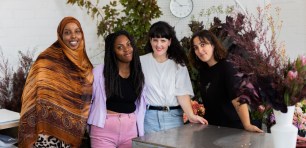
Source: Supplied
Three Australian entrepreneurs are among the finalists of the first ever Oceania awards category of the 2023 edition of the Cartier Women’s Initiative (CWI), a prestigious global entrepreneurship program that supports and empowers women changemakers who are creating innovative and socially responsible businesses, with the winner of the category set to be announced during the Cartier Women’s Initiative Awards Ceremony in May in Paris.
The Australian fellows are Lily Dempster, CEO and founder of One Small Step, a consumer technology profit-for-purpose startup that supports the mass decarbonisation of society by encouraging deep behaviour change across multiple sectors; Ingrid Sealey, founder and director of Teach Well, which improves education outcomes for Australian students with high impact teacher training; and Telecare co-founder and chief operating officer Lina Xu.
Telecare is a virtual specialist clinic and healthcare startup founded in 2019 by Xu, alongside CEO Michael Wang, nephrologist Dr Christopher Sia and general practitioner Dr Raymond Wen. It’s a digital platform that provides patients with high-quality specialist consultations from their home, facilitated by a GP or their hospital partners.
In its 16th year, the Cartier Women’s Initiative is an annual international program open to women-run and owned businesses that have a strong and sustainable social and/or environmental impact on society. This year’s program features a total of 11 awards, comprising nine regional awards, including Oceania and Francophone Sub-Saharan Africa launched this year, and two thematic awards.
Speaking to SmartCompany, Xu said to be one of three representing Australia/Oceania in the CWI is a highlight of her career.
“A true game-changer in my entrepreneurial journey,” she says.
“I am thrilled for this opportunity as a 2023 fellow for the Cartier Women’s Initiative. It is a great honour to be chosen for this global entrepreneurship program that supports and empowers women changemakers creating innovative and socially responsible businesses.”
The CWI has created a “unique space and community for impact women entrepreneurs to manifest the unbelievable into the tangible and breaking the glass ceilings to pursue gender equality in socially impactful innovations and venture building”, she said.

Source: Supplied
“Their vision resonates with my own in a profound way, and their carefully designed coaching, due diligence, pitching and PR programs throughout the 12 months period really pushed me outside of my comfort zone to break through to a whole new level of leadership to amplify our impacts.”
Cartier Women’s Initiative’s first-place awardees will take home USD $100,000 in grant funding, while the second and third-place awardees will receive USD $60,000 and USD $30,000 respectively.
In addition to the grant funding, all 33 fellows will also benefit from tailored mentoring and coaching, media visibility, networking opportunities and education courses from the leading business school INSEAD.
Finding connections
Xu says in 2019, six months before COVID, as a new immigrant and a new mum with two young children, the inner urge to break through and restore her confidence pushed her to start Telecare.
“I wanted to prove that I am a valuable member of this new society that is now home to me,” she says.
“Back then, I was adapting to life as a new mother and feeling disconnected from a society I found baffling. My husband, co-founder of Telecare, and I decided to start a venture using technology to transform healthcare delivery. We envisioned a new virtual care model that could address country-wide access disparities between rural and urban populations, particularly the discrepancy between supply and demand for practitioners.
“Resistance waned as doctors saw how effectively Telecare’s digital platform links patients anywhere in the country with medical specialists nationwide. Patients can easily book online appointments directly through the company’s patient portal or through their general practitioner. For doctors and hospitals, the company offers virtual administration, combining software-enabled administrative support to manage everything from referrals to billing and follow-up appointments so clinicians can focus on medical care.”
Xu says the company’s offerings also help create parity between female physicians and their male counterparts.
“Women represent only about a third of Australia’s specialty healthcare workforce because many women leave the workforce for a period of time to care for children. The flexibility of a telehealth model lets them fit their practice around their family,” she explains.
“Telecare has reduced the average wait time for referral visits to about three weeks, compared with public waitlist turnaround time of around 18 to 24 months. Now we primarily focus on public/private partnership with public hospitals. Since July 2022, we have signed service contracts with 15 public hospitals nationwide.
“The highlight of our success has been to break the red tape in the public health system to pilot virtual care models that help address the acute rural workforce shortage and prolonged patient wait times.”
In the coming years, Xu says Telecare plans to contract with more public hospitals to provide free services to patients in need.
“Additionally, bringing long-delayed investment in automation to hospital administration will streamline communication among specialists and reduce administrative costs,” she says.
“Telecare has brought healthcare delivery in Australia far beyond faxes and snail mail, and with continued innovation will take it much further in years to come.”
Handpicked for you

Circle In lands $2 million to expand its platform beyond support for working parents



COMMENTS
SmartCompany is committed to hosting lively discussions. Help us keep the conversation useful, interesting and welcoming. We aim to publish comments quickly in the interest of promoting robust conversation, but we’re a small team and we deploy filters to protect against legal risk. Occasionally your comment may be held up while it is being reviewed, but we’re working as fast as we can to keep the conversation rolling.
The SmartCompany comment section is members-only content. Please subscribe to leave a comment.
The SmartCompany comment section is members-only content. Please login to leave a comment.